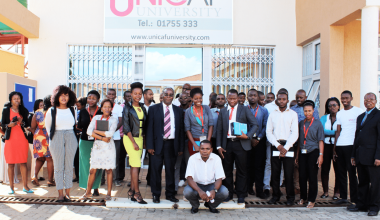Are you considering taking 1-year master’s degree program? Do you consider Canada as a better option? Are you also caught up in other options and how to reach the best decision for you? Viola! We have good news! This article will help clear out the doubt in your mind about studying a master’s degree in Canada.
Interestingly, the country ranks third for the best master’s degree programs for international students in the world. Also, according to the Canadian Bureau of International Education, the country ranks third with the highest percentage of international students in the world.
Hence, if you are interested in learning more about master’s degrees in Canada, this page covers essential information about Canadian universities, applications, and graduate programs. Alternatively, we have a guide on tuition fees and financing in Canada, as well as study visa permits and the cost of living in Canada.
Obviously, before we go deeper into listing out the prestigious universities where you can study for 1 year Master’s degree program in Canada; let’s consider other important information you need to understand before applying to any of these schools in Canada. Such as what studying master’s in Canada entails; Study visa permits in Canada, Cost of living in Canada, as well as Scholarships in Canada.
Table of contents
- How can I get a scholarship in Canada?
- 1. Know where to search for scholarships;
- 2. Prepare in advance for scholarships;
- 3. Work hard and stay motivated;
- 4. Distinguish yourself from other applicants;
- 5. Read the instructions meticulously;
- 6. Submit an exceptional essay or cover letter;
- 7. Apply for every eligible scholarship;
- 8. Be Positive;
- Do international students get need based financial aid?
- Which university gives free scholarships in Canada?
- What GPA do I need for a scholarship?
- What is the best website to apply for scholarships?
- How Long is a Master’s Degree in Canada?
- Frequently Asked Questions
Why Study Masters in Canada?
Obviously, Canada is one country that is recognized for its immense diversity and harmony among people of diverse cultures, its kindness, its immaculate nature, and its world-class universities. Canada has become one of the most popular study abroad destinations for international students.
Equally, Canada not only has one of the most magnificent landscapes in the world but it is also known worldwide for its higher education system. Although it can be expensive for international students to attend certain schools or universities in Canada, it can’t be compared to studying in the UK or Studying in the United States of America (USA).
This country also has one of the best reputations when it comes to the quality of education. In addition, Canada offers students a peaceful, safe, and diverse environment, excellent working conditions and a learning atmosphere.
Some of the best universities and colleges in the world are in Canada. Experts in journalism, politics, medicine, and technology began in universities such as the University of Toronto and McGill University. Above all, you will have the opportunity to work alongside some of the brightest minds in the world.
If you are someone who wishes to acquire an additional specialization in the field of your choice in Canada, here is a complete blog that will guide you through various aspects of the search for 1-year master’s programs in Canada.
How can I get a scholarship in Canada?
To get scholarships in Canada you’ll need to do these:
1. Know where to search for scholarships;
Use a scholarship search engine, search credible websites, blogs, schools update, etc. Just ensure you’re getting the authentic info on the call-out.
2. Prepare in advance for scholarships;
Don’t always be taken unawares, push your IQ a little harder, or maybe, your efforts require the pushing even to acquire results that attract scholarships.
Get involved with your community, it is called volunteering, it often sells big-time for some major scholarships too.
Either way, whatever the major requirements will be; volunteer experience, GPA, etc, make such to have enough of that.
3. Work hard and stay motivated;
you MUST be your first cheerleader. Cheer yourself on, motivate you, then add some hard work to all that self-cheerleading!
Furthermore, be passionate, very passionate. It fuels and sustains hardwork.
4. Distinguish yourself from other applicants;
I cannot overemphasize this, STAND OUT! Give the scholarship sponsor what it wants, this you can achieve by deeply learning about scholarship odds. This gives you an advantage that enables you to interpret the requirements better.
Don’t just do well with your grades or volunteering experience or any other requirements, add ‘top-notch’ to it.
Literally, blow your own mind with your results, then we will be near too certain that your scholarship benefactors will be overly blown.
For one, you will already stick OUT from the rest of the applicants with such extremely great results. Keep pushing you!
5. Read the instructions meticulously;
NEVER be in a hurry to BRUSH through any scholarship’s instructions. That may be the beginning of rejections, but no, not for you, please.
However, it would be best if you paused, breathe, then read again very slowly. When you’re done, go another slow round.
In the end, you’ll find some near-unnecessary detail that could have caused you the scholarship award. So dear, always ensure you read every part of the instructions, even the numbering. (Grins away)
Also, don’t ignore the optional questions! They can be very tricky! Answer just everything. It could be what eventually stands you out.
Research about additional opportunities and understand the requirements. Also, ensure to check out the eligibility criteria of all available Canadian scholarships for international students or citizens.
Don’t spend your time applying to awards that you’re not actually eligible for, because it reduces your chances of gaining a scholarship.
Read the eligibility requirements very carefully. If you’re not sure what one requirement means, or if it applies to you, ask the award administrator.
It takes only a few minutes to ask questions for clarity. Now compare that to hours of writing an essay for an award you can’t win. I’m sure you don’t want any of that!
6. Submit an exceptional essay or cover letter;
Want to hear some truth? Sometimes, you meet all the requirements, but, your only downer was the cover letter.
If you have to take a course, by all means, do! But you MUST perfect the art of drafting a SWELL cover letter.
Very strategically, look for essay contests and send in your essays to as many call outs as possible. It builds your essay writing skill better.
7. Apply for every eligible scholarship;
The trick to winning scholarships is often by applying for several at once. The more scholarships you apply for, the better your chances of winning at least a few.
So, keep applying for as many eligible scholarships as possible.
8. Be Positive;
This cannot be oversaid. Search, read, and apply stay very positive about getting every scholarship. Believe you’ll get the scholarship, that’s sure how winners keep winning.
You sure will want o get great news while immersed in your positive energy, so yeah, allow yourself to be immersed in that during the waiting.
The positive response from the scholarship benefactors will eventually come, so relax already.
Do international students get need based financial aid?
At most colleges, international students are only qualified for merit-based aid. However, you won’t qualify for federal aid at all and in most cases, you won’t qualify for institutional need-based aid either. Your best bet is the merit-based scholarships and then the scholarships for international students.
Unlike their U.S. counterparts, international students are often not eligible for the financial aid that can help bring down college costs. To qualify for federal student aid, for example, students must be U.S. citizens or eligible noncitizens, such as lawful permanent residents.
However, some colleges offer institutional aid to international students.
Which university gives free scholarships in Canada?
Universities in Canada that give free scholarships include;
- Vanier Canada Graduate Scholarship
- University of Waterloo International Master’s and Doctoral Awards
- Ontario Graduate Scholarship
- Ontario Trillium Scholarship
- University of Manitoba Graduate Fellowships
- University of Calgary Graduate Awards
- Trudeau Foundation Scholarships
- UBC Graduate Global Leadership Fellowships
- Banting Postdoctoral Fellowships
- Canada Graduate Scholarships – Master’s Program
- NSERC Postgraduate scholarships
- Carleton University Awards for International Students
- Dalhousie University Scholarships
- Fairleigh Dickinson Scholarships for International Students
- McGill University Scholarships and Student Aid
- Queen’s University International Scholarships
- University of Saskatchewan International Student Awards
- Simon Fraser University Financial Aid and Awards
- Western University International Admission Scholarships
What GPA do I need for a scholarship?
The GPA that you need to get a full-ride scholarship differs from college to college.
Some scholarship benefactors could ask for a GPA like 3.5 – 3.7 on a 4.0 scale. They may rank you based on class (e.g. top 9% or 15% in your school). Others may look at the ACT or SAT ratings.
See the top 20 study Hacks every Student Should Adopt In 2024.
What is the best website to apply for scholarships?
The best website to apply for scholarships is the torixus.com
What Studying 1-Year Masters Degree Programs in Canada Entails
Pursuing a master’s degree program in Canada is possible when you follow the right procedures and take consequential actions. These procedures cover visa permits, tuition costs, and much more.
Masters Student Visa Permits in Canada
In order to study in Canada, you must get a Canadian study permit, which serves as a Canadian student visa for the duration of your stay.
You do not need a Canadian study permit if your course or program lasts six months or fewer. However, it may be a good idea to apply for a permit before coming to Canada, anyway. Otherwise, if you decide to continue your studies in another program, leave Canada to apply for a study permit with a visa office.
Once you have a Canadian study permit, you can request for renewal from Canada if you decide to continue your studies. For full-time students enrolled in an accredited institution of higher education, a study permit also allows them to work part-time on campus.
Below, we will help you with all you need about Canada student visa.
To be eligible for a Canadian study visa, students must show that a college or university has accepted them in Canada. Equally, they need to prove that they can stay and pay the fees.
Also, they need to submit a clean record on criminal records. Students may be asked to undergo a medical examination in certain cases before a student visa is issued.
You must also provide proof of financial support, such as bank statements and scholarship letters, to show that you can pay your tuition, living expenses, and a return ticket to your home country.
You can apply for a Canadian study permit online or through a paper application, which you can get from the Citizenship and Immigration Canada (CIC) website.
However, paper applications take about twice as long, and it is always recommended to check processing times well in advance. To apply online, you will need a credit/debit card and the ability to create electronic copies of your coupons (that is, using a scanner or photo device).
The visa office in your country will provide you with specific instructions on the documents you must provide. This may vary depending on your location. If you need help, you can get help from the nearest Visa Application Center (ACC).
The process to get a Canadian student visa is:
- You must first get a standardized acceptance letter from a recognized higher education provider. Students studying in Quebec must also apply for an acceptance certificate, called CAQ, from the Quebec government.
- The next step is to get a Canadian student visa application package, either from the CIC website or by contacting your local Canadian visa office, embassy, or consulate in your home country.
- To obtain your application package, you must answer some questions about yourself on the CIC website. These questions will determine if you are eligible to apply for a Canadian student permit online and what documents you must provide.
- If you are considered eligible, you will receive a personal checklist code, valid for 60 days, that you must submit your application online. Be sure to print the page that contains your code for future reference. The page will also include an application guide, an estimated tuition fee, a list of documents that you must submit with your application, and instructions for your next steps.
- When you are ready to apply, create a MyCIC account, where you will enter your personal checklist code. You will then receive your personal document checklist that allows you to download and send your documents to CIC. You will need a printer or scanner to do this.
- Once you have your documents and application form ready and have paid your fees, you can send your completed application to CIC.
- Some applicants may be required to attend an interview at their local visa office.
How Long is a Master’s Degree in Canada?
A master’s degree in Canda usually lasts between one to two years. There are certain cases where the program might last about three years, and this type of program usually involves deeper technical and research work.
All international students prefer a one-year master’s degree program when they want to study in Canada.
Cost of Living in Canada
Since you are planning to move to Canada for your study, it is important to understand how much it costs to live there. Especially, for international students, admission to Canadian universities and colleges requires planning and a financial commitment before arrival.
Basically, International students will be responsible for the costs of studying and living in Canada. However, Citizenship and Immigration Canada (CIC) requires proof that you have enough money and funds available.
Because your university provides the estimated cost of living, the immigration officer will follow. If your university does not provide it, you must show proof of $10,000 for 12 months of living expenses for a student. An additional $4,000 will be required for the spouse and another $3,000 for each dependent. This amount includes accommodation, food, medical insurance, transportation, books, and clothing. Tuition and other fees are not included in this amount.
Equally, it is essential that students get medical and hospital insurance, since medical care in Canada is very expensive. Public health insurance plans are administered independently in each province. Some universities require mandatory insurance coverage. Coverage must be provided within the first week after arrival.
As in all parts of the world, the cost of living in urban centers is higher than that of the suburbs. Many students prefer campus accommodation much more, which is not always the cheapest option, but it is certainly more convenient. Toronto and Vancouver are the most expensive cities to live in and with the shortage of affordable housing in Toronto, costs are the highest and continue to rise.
As the cost of living varies from one city to another and depending on where the school is located, the best-estimated living costs will depend on the university to which you are applying. As mentioned earlier, each university abroad provides estimated fees and living expenses. Some universities have reasonable and affordable boarding options on campus, some universities charge a lot for the same.
Tuition Fees and Financing in Canada
Getting admission to study for a Master’s degree in Canada is the first step to your success. But gaining admission doesn’t mean you will end up studying over there. Reason being that you might end up not having the fund to pay for your tuition.
This page of this article will give you well-detailed information about tuition fees and funding for Master’s degrees at Canadian universities.
Master’s Tuition fees for Canadian Students
As a Canadian citizen, you will benefit from significant government investments in higher education. This maintains relatively low master’s fees for national students, at approximately half of the rate paid by international applicants.
During the 2018-2019 academic year, the average cost of a master’s degree in Canada was $7,086 CAD ($5,340 US). Usually, your university will calculate this total based on the price of a fixed number of fees (the fees paid for each semester of study) plus additional fees (such as administrative fees).
Keep in mind that each Canadian university sets its own rates and these may vary. Some degree programs can also be more expensive, especially those in professional fields such as medicine. However, the average cost of an executive MBA, for example, is $49,798 CAD ($37,520 US).
Continuation Fees
Most Canadian masters last between one and two years. If you exceed the normal duration of your program, you may be charged extension fees for additional years of enrollment. The cost is generally less than CAN $1,000 (US $750).
Additional Charges
Most of the price of a Canadian master’s degree consists of tuition fees. But universities may also charge additional fees for administrative fees, services, and resources.
Registration fees and student services are quite common and generally cost less than $100 CAD ($75 US). Other fees are likely to depend on your program and may include lab fees and sports facilities, as well as exam fees.
These additional fees may be included in the advertised price of your master’s degree, but it is worth checking to confirm.
Health Insurance
As a Canadian citizen, you will be covered by the publicly funded health insurance system for most health-related expenses. In addition to this, universities generally offer their own health insurance for students, covering additional expenses such as dentistry and prescription fees.
The price of this coverage varies but generally ranges from $200 to $300 ($150-225). Some institutions may allow you to refuse your health insurance, but others will make it a mandatory registration condition. You should contact your university for more information.
Master’s Fees for International Students in Canada
Canada is proud to be a historically multicultural country, which welcomes students from all over the world. This extends to international rates for their study programs. The rates for an international master’s degree in Canada are higher than those of national students but are often lower than those of another major English-speaking study abroad destination.
On average, you can expect to pay up to double the tuition fee of an equivalent domestic student, with typical fees between $13,000 CAD and $20,500 CAD ($9,930 $16,430 USD).
Basically, costs will vary by university and program of study. Like national students, you will usually pay more for professional subjects (especially medicine).
Whatever your tuition fees, funding for postgraduate studies abroad in Canada is available from a wide range of sources.
Health Insurance for International Students in Canada
Health insurance is mandatory for international students in Canada. The following Canadian provinces cover international students as part of their regular public health care plans:
- Alberta
- British Columbia
- Manitoba
- New Brunswick
- Newfoundland and Labrador
- Saskatchewan
However, if you are studying in Nova Scotia, Ontario, Prince Edward Island or Quebec, you must purchase specific international health insurance for students. The cost of which normally ranges between $600 CAD and CAD $1,000 per year ($460 to $770 US).
The Canadian government immigration service maintains a page that contains details of the provincial health departments.
If in doubt, contact your future university. They should be able to confirm their needs and most will provide their own medical care to the students.
Other Costs
Master’s degrees in Canada sometimes incur additional costs in addition to standard tuition fees. These include mandatory fees for administration and student services, as well as specific expenses related to the courses.
Basically, the costs will generally not be higher for international students. Expect to pay between $100 CAD and $500 CAD ($77 to $385 US), depending on your study program.
The only additional fees that apply specifically to students studying abroad in Canada are the international application fees. It usually costs about $250 CDN ($190 US) but is not required by all universities.
Scholarships in Canada
As an international student in Canada, you will not be eligible for the same public funding as domestics students. This means that you cannot apply for loans or grants (although some research board funds may be available).
However, don’t worry!
There are many other funds available for international master’s students in Canada. In fact, there are several scholarship programs only to attract and support graduate students studying abroad at Canadian universities.
Scholarships Given by Global Affairs Canada
Global Affairs Canada (GAC) is the department of the Canadian government that oversees its foreign affairs. GAC maintains and manages a wide variety of international awards from the Canadian government and other providers (including Canadian research councils).
You can see a list of scholarships offered by Global Affairs Canada on their website. Please note that all options presented will not apply to master’s degree students.
International Scholarships from Canadian Universities
Some Canadian universities offer their own master’s scholarships to help them recruit high-quality international graduates.
Its availability varies from one institution to another. Therefore, the best way to find out what is available to you is to verify the information published by individual universities.
Alternatively, you can use our course search to find a specific master’s program in Canada, then get in touch to inquire about international scholarships. All courses listed on torixus.com have their details about their respective available subject scholarships.
Master’s Scholarships in Canada
Of course, there is one last source of master’s funding in Canada to mention before you leave this page. It is our own list of the best and cheapest master’s scholarships in Canada. They include:
- MasterCard Foundation Scholarship For Africans At UBC, Canada
- 12 Cheapest Online Masters Program in Canada
- Latest Canada Scholarships for Undergraduates, Masters & Ph.D. Programs
Applying for a 1 Year Masters Degree Programs in Canada
When applying for a 1-year master’s degree program in Canada, there are basic requirements you need to have. They include:
Academic Requirements
You are expected to have a minimum GPA (often a 3.0 / 4.0 or its international equivalent, such as a British second-class baccalaureate) for your university degree.
Depending on your field, you may be asked to provide a Postgraduate Entrance Test score. Such as a Graduate Management Admission Test (GMAT) or a Graduate Registration Review (GRE).
You Can Get to Study in Canada without IELTS, GMAT and Other like Exams. Click on the link to find how to do that.
Language Requirements
If English is not your first language, you must prove your proficiency through an English exam such as TOEFL or IELTS. Similar requirements will apply in French if you are applying for a bilingual program or a course taught entirely in French.
Application Process
The application process is like other countries. You must submit the following in your application:
- A completed application form, often submitted online
- A certified copy of your qualifications and transcripts.
- Fluency test in English and/or French, depending on the program you are requesting
- A curriculum vitae
- References/letters of recommendation
- Cover Letter/Personal Statement
If you completed your post-secondary studies outside of Canada, you may need to undergo an evaluation to determine the Canadian equivalent of your qualification. And verify the academic document you have submitted. Pay an international credential evaluation fee unless you already have a third-party international credential evaluation report.
Generally, your application will be evaluated by a central office to ensure that it meets all minimum entry requirements. It is then sent to the faculty/school, which will evaluate the academic quality and suitability of your application for the program of your choice.
If successful, you will receive an admission letter, which you will need to apply for a visa or scholarship (if applicable) and complete your registration before the deadline.
1 Year Masters Programs in Canada: Top Universities
Canada hosts some of the best institutions in the world. These universities or colleges offer a variety of degree programs. Being recognized worldwide, studying these courses gives you the opportunity to work anywhere in the world.
Here is the list of the best universities that offer 1-year master’s programs in Canada:
- University of Toronto
- University of British Columbia
- McGill University
- University of Winnipeg
- Ivey Business School at Western University
- Westford University College
#1. The University of Toronto
Acceptance Rate: 65%
Number of Programs: 4
Tuition Fees: $10,080
The University of Toronto is an accredited public research university founded in 1827. Over the years, it has become the leading research university in Canada to learn, discover and gain knowledge.
Basically, the university offers a wide range of 1-year master’s programs in multiple disciplines. The course curriculum for these courses aims to equip students with skills and knowledge to enter the industry.
Officially, they offer over 700 undergraduate and 200 graduate programs at the University of T.
#2. University of British Columbia
Acceptance Rate: 53%
Number of Programs: 5
Tuition Fees:
The University of British Columbia is considered a world center for research and education. Founded in 1908, the university is regularly ranked among the top 20 public research universities in Canada.
Basically, UBC offers excellent one-year master’s programs in various disciplines, including computer science, finance, information technology, etc. Above all, the university is made up of professors from all over the world with experience in large research projects.
In addition, the university is among the three best universities in Canada.
#3. McGill University
Acceptance Rate: 46.3%
Number of Programs: 3
Tuition Fees: $10,080
Basically, McGill University is one of the most reputable public research universities in Canada. Ranked among the top 30 research institutes in Canada, it attracts thousands of international students from over 150 countries.
Their Master of Administration in Finance and Master of Administration in Analysis are some of the famous 1-year programs. Above all, their international, innovative and integrated MBA, MMF, program designed to train extraordinary leaders with integrity that they can manage in all disciplines to lead anywhere in the world.
#4. University of Winnipeg
Acceptance Rate: 49.4%
Number of Programs: 2
Tuition Fees: $10,206.00
Winnipeg University is a public research university in Winnipeg, Manitoba, Canada, which offers undergraduate faculties in art, business and economics, education, science and kinesiology and applied health, as well as graduate programs.
Specifically, another popular educational institute in Canada is Winnipeg University. It has attempted to expand his postgraduate courses and currently offers a wide range of master’s programs in various disciplines, including administration, business, finance, marketing, psychology, research development, etc.
#5. Ivey Business School at Western University
Acceptance Rate: 36%
Number of Programs: 6
Tuition Fees:
Interested in Big Data, AI or digital transformation? Ivey Business school offers MMA program that will help you gain the skills and practical experience through experimental learning for a career in these exciting and demanding fields.
Above all, you can also start your career in finance with their MMF program. Basically, you will offer a complete program that integrates advanced financial concepts with real-world business practices while continuing to rely on your network in the financial world.
#6. Westford University College
Acceptance Rate: 35%
Number of Programs: 6
Tuition Fees: $20,954
Westford promises a stimulating and incredible experience for all participants with its one-year accelerated MBA programs.
Also, the Westford MBA attracts competent and highly qualified students from a wide range of professions, geographic boundaries, and different cultural backgrounds, to take part in this incredible year-long learning and fun journey.
The program is a unique experience for all participants, as it creates strong connections, positive vibes, bright ideas, team discussions, strong partnerships, and new business associations.
Find Your Study Program
- Masters in Canada
- Masters Scholarships in Canada
Frequently Asked Questions
The number of masters programs is growing constantly and more colleges are getting accredited to provide them. This suggests that there are more compelling reasons for students to select Canada given the diversity of available academic options.
The following are the requirements for a 1-year master’s degree in Canada:
Statement of Purpose and Letters of Recommendation
A minimum GPA of 3.0/4.0 or equivalent
English language proficiency tests such as the TOEFL, IELTS, PTE
Yes, there is a plethora of 1-year master’s programs in Canada and they are:
1. Education
2. Finance
3. Healthcare Administration
4. Accounting
5. Business Administration
6. Counselling & Therapy
7. Criminal Justice / Homeland Security
8. Human Services
9. Information Systems / Technology
10. Management
Conclusion
Frankly, you need to choose to study a master’s program in one of the Canadian colleges and universities. Because their graduates are highly valued in the labor market, and those who study there have been able to find good jobs in all fields of interest.
We hope this blog has allowed you to discover several one-year master’s programs in Canada. If you are considering getting higher education in Canada but are not sure how to begin the process, World Scholarship Forum experts can help you choose an appropriate course that fits your career goals.
We will provide you with the best advice and support to ensure that you study a program at the university of your dreams.
References
- leverageedu.com – 1 Year Masters Programs In Canada
- findamasters.com – Masters Study in Canada – A Guide
- masterstudies.com – Study in Canada
- topuniversities.com – How to Get a Canadian Student Visa
- studyabroad.shiksha.com – Cost of Living in Canada for International Students
We Also Recommend
DISCLOSURE: This post may contain affiliate links, meaning when you click the links and make a purchase, we receive a commission.






Comments are closed.